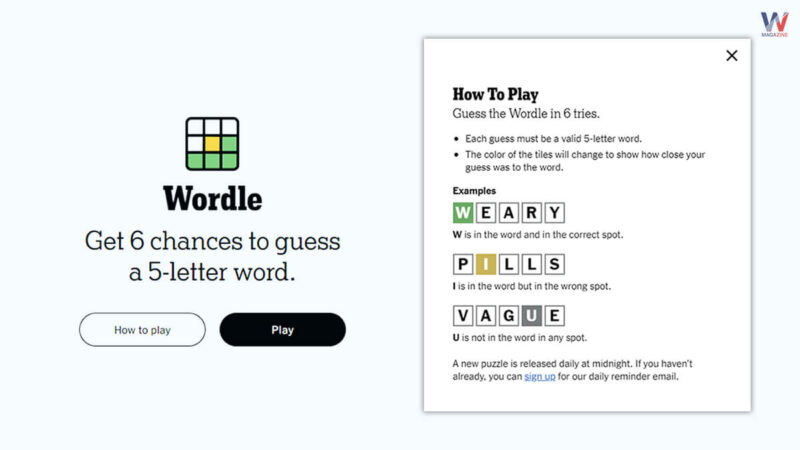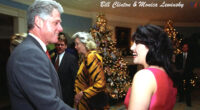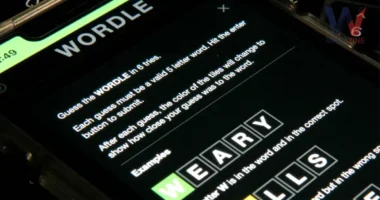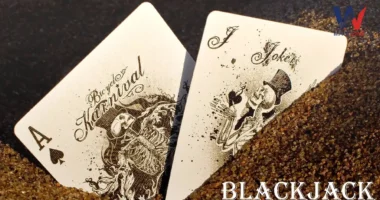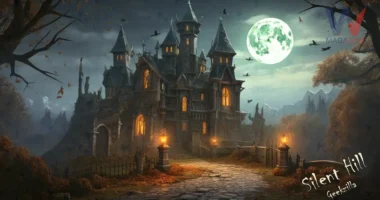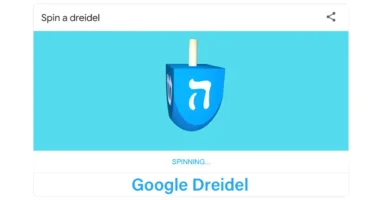Table of Contents
Wordle is a fun online word game made by Josh Wardle a software engineer from Wales. In this game, players have six tries to guess a five-letter word. After each guess, the game shows colored tiles to indicate if the letters are correct and in the right place. This game is similar to the old pen-and-paper game Jotto and the TV show Lingo. Every day, there is one word for everyone to guess.
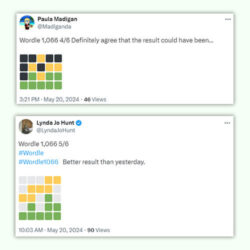
Wardle originally made the game for his partner and then he released it to the public in October 2021. The game became very popular in December 2021 after Wardle added a feature that allowed players to share their daily results as emoji squares on Twitter. This led to many people talking about the game online. Many copycat games and versions in other languages also appeared.
In January 2022, The New York Times Company bought Wordle for a seven-figure amount and moved it to their Games section in February.
Gameplay
Every day, a new five-letter word is chosen and players try to guess it within six attempts. After each guess, the game uses three colors to give feedback on the letters:
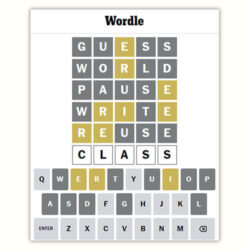
- Green: The letter is correct and in the right spot.
- Yellow: The letter is in the word but in the wrong spot.
- Gray: The letter is not in the word at all.
If you guess a word with repeated letters like “robot” the game will color the repeated letters green or yellow only if they appear more than once in the answer. Otherwise, the extra letters will be gray. There is also a “hard mode” that makes you use the green and yellow letters in your next guesses.
Everyone gets the same word to guess each day. The game also has a dark mode and a high-contrast mode for colorblind players changing the colors from green and yellow to orange and blue.
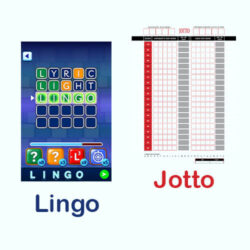
Wordle is similar to old games like Jotto and the TV game show Lingo. It also shares some gameplay elements with the board game Mastermind and the game Bulls and Cows, except Wordle tells you the exact letters that are correct.
The daily words come from a list of 2,309 words chosen by Wardle and his partner. They filtered this list based on words she knew, didn’t know or might have known. Wordle uses American spelling which some players outside the US find unfair (e.g., “Color” instead of “Colour”).
“Today’s Wordle hint from Newsweek gives helpful tips to make solving the daily puzzle easier.”
Common first guesses include “adieu,” “audio,” “stare,” “raise” and “arise.” However, words like “adieu” and “audio” might actually make it harder to solve the puzzle. Starting with words like “slate” can be more effective. Computer algorithms can solve Wordle with 100% accuracy within five of the six allowed guesses.
History
Early Development
Josh Wardle came up with the idea for Wordle in 2013, inspired by the game Mastermind. His initial version allowed players to solve multiple puzzles in a row and included all 13,000 possible five-letter words in English. However, his partner Palak Shah found some of the words too difficult to recognize, making the game as random as Mastermind.
To improve it, Wardle and Shah filtered the word list down to about 2,000 more common words, enough for around five years of daily puzzles. After finishing the prototype in 2014, Wardle lost interest and put it aside.
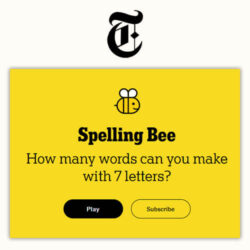
During this break, Wardle created two online social experiments called The Button and Place while working at Reddit. When the COVID-19 pandemic began, he and his partner got hooked on The New York Times Spelling Bee and daily crossword puzzle. This rekindled Wardle’s interest in his Wordle prototype.
He incorporated two ideas from Spelling Bee: a simple website design and one puzzle per day. By January 2021, Wardle had launched Wordle on the web, sharing it mainly with his partner and himself. He named it Wordle as a play on his surname.
“This platform is also inspired by the Wordle name so, we have named it after the word as Wordle Magazine.”
Rise in Popularity
Josh Wardle shared Wordle with his family and they quickly became obsessed with it. Over the next few months he shared the game with close friends leading to its viral spread by mid-October 2021. In one instance, it became popular with a group of friends in New Zealand who created an emoji-style display of their guesses. This inspired Wardle to add the feature to the game which contributed to Wordle becoming a viral sensation on Twitter in late December 2021.
By January 2, 2022, over 300,000 people were playing Wordle up from just 90 players on November 1, 2021. This number skyrocketed to over 2 million a week. Between January 1 and 13, 1.2 million Wordle results were shared on Twitter. Media outlets like CNET and The Indian Express credited the game’s popularity to its daily puzzles. Wardle believed that having only one puzzle per day created a sense of scarcity, making players eager for more and encouraging them to spend only a few minutes on the game each day. He also pointed out the game’s subtle features like the changing keyboard as reasons for its appeal. Wardle had no plans to monetize the game, emphasizing that it was just meant to be fun and wasn’t collecting user data.
Interestingly, an unrelated game called Wordle! by Steven Cravotta, released on the App Store five years earlier, saw a surge in downloads as people mistook it for Wardle’s game. Between January 5 and 12, 2022, Cravotta’s game was downloaded over 200,000 times. Cravotta and Wardle decided to donate $50,000 of the revenue to Boost a charity providing tutoring to children in Oakland, California.

Google added a fun Easter egg to their search page, turning their logo into an animated game of Wordle when people searched for “Wordle.”
Twitter also took steps to block a bot that was spoiling the game by auto-replying to Wordle result posts with the next day’s word.
Acquired by The New York Times
On January 31, 2022, The New York Times Company bought Wordle from Josh Wardle for a price in the low-seven figures. Wardle mentioned that the sudden fame made him and his partner uncomfortable and he didn’t want to deal with the numerous clones of the game. Selling Wordle allowed him to step away from these issues.
Jonathan Knight from The Times’ games department reached out to Wardle on January 5, 2022, shortly after Wordle was featured in a Times article.
“With Wordle, a few minutes of wordplay become a moment of connection and fun for millions.” — Jonathan Knight
By January 31, the acquisition was completed. The Times moved quickly, even beating out The Washington Post to buy the game.
The Times planned to include Wordle in its mobile app alongside its crossword puzzles and Spelling Bee, aiming to reach 10 million digital subscribers by 2025. Initially, the game remained free for everyone and no changes were made to its gameplay. Fans worried the game might eventually go behind a paywall. Some players even downloaded the webpage to play offline fearing undesirable changes by The Times.
On February 10, Wordle officially moved to The New York Times’ website with player statistics carried over. However, some players reported that their daily streaks reset after the switch. The Times only made two significant changes: moving the game to React for better integration with their online games app and allowing users to log in with their NYT account to track progress.
The Times removed some words they found insensitive or offensive like “slave” and “lynch” to make the game more accessible. They also eliminated some British spellings such as “fibre.” Additionally, they adjusted planned words in response to current events to keep the game separate from the news. For example, they removed the word “fetus” following a Supreme Court case leak related to abortion.
By July 2022, The Times had removed a total of seven words from the original 2,315 Wordle answers. This caused the Times version to be out of sync with cached or saved versions of the game, making it difficult for players to compare their results.

On August 24, 2022, the New York Times Crossword app was updated to include Wordle with progress synced between mobile and desktop versions.
On April 7, The Times launched WordleBot, a tool to give players feedback on their Wordle performance, rating their luck and skill. Some users felt the WordleBot responses were patronizing and insulting as the analysis progressed.
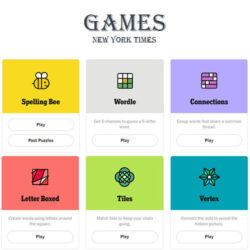
According to The NYT quarterly earnings report ending on March 31, 2022, acquiring Wordle brought “tens of millions” of new players to their puzzle site and app. Many of these players continued to engage with other puzzles offered by The New York Times, leading to what the editors called a “Hot Wordle Summer” with further increases in player numbers.
Editor
In November 2022, The New York Times hired Tracy Bennett as the dedicated editor for Wordle. Her job is to select the word of the day from a curated list.
“In an age of complex entertainment, Wordle’s charm lies in its elegant simplicity and the joy of a shared challenge.” — Tracy Bennett
In January 2023, Bennett explained to Today that while the words are initially chosen randomly she reviews each one for suitability. She removes any words with secondary meanings that could be considered profane or derogatory. Bennett also avoids words that are difficult to guess because they have many common letters with other words such as “found” which could be confused with eight other options.
The words that receive the most complaints are often unfamiliar terms like “parer,” “rupee” and the US-specific “condo.” Bennett has introduced the idea of connecting the word to the specific day such as using “BEGIN” on her first day, “MEDAL” on Veteran’s Day (November 11) or “FEAST” on Thanksgiving (November 24). This thematic approach was not part of Wardle’s original word list. However, not everyone appreciated this change, for instance, Lizzie O’Leary from Slate prefers Wordle to remain challenging and unique.
Usage
Wordle was the top Google search term worldwide and in the United States in 2022. Its popularity also influenced other search trends, as many players looked up the definitions of Wordle answers. Seven of the top 10 most-searched word definitions in 2022 were Wordle answers including cacao, homer, canny, foray, trove, sauté and tacit.
At the March 2023 Game Developers Conference, New York Times producer Zoe Bell shared data on Wordle’s influence on other Times games. Wordle’s player count peaked around March 2022 and although it has since decreased, it remains at about half of its peak level a year later. Importantly, Wordle’s success has increased interest in other Times games, with daily player counts for these games continuing to grow as of March 2023.
“Wordle daily puzzle is a delightful reminder that sometimes, the best experiences are those we can share with others.” — Zoe Bell
Adaptations & Clones
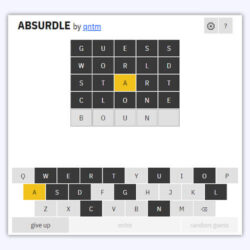
After Wordle’s popularity surged in early 2022, many clones appeared. Some altered the game in creative ways. For example, Absurdle, made by British programmer qntm is a challenging version where the target word changes with each guess while still fitting previous clues. Other clones kept the same mechanics but changed the word list including translations into other languages and themed versions like Sweardle for swear words and Weddle for NFL players.
“NFL is among the most famous games but do you know how much do NFL Referees make? These things a bit of interesting just like Wordle.”
Wordle was even adapted for older devices like the Nintendo Game Boy (GameBoy Wordle), the Nintendo 3DS (Wordle DS) and the Nokia N-Gage.
Several new games used the “-le” suffix to show a link to Wordle, despite having different gameplay. These include:
- Semantle: Players find a word with a similar meaning.
- Squabble: A battle royale version of Wordle.
- Waffle: Players arrange scrambled letters in a 5×5 grid to form six words.
Wordle also inspired non-word games:
- Worldle: Identify a country or territory by its silhouette.
- Heardle: Guess songs from short clips (acquired by Spotify in July 2022).
- Nerdle: Solve an 8-digit math equation.
- Framed: Identify a film from a short clip.
- Quordle: Solve four word puzzles at once (acquired by Merriam-Webster in January 2023).
In early January 2022, many ad-supported Wordle clones appeared on Apple’s App Store, often using the same name. Most of these clones were removed by the end of January. The New York Times, after acquiring Wordle, applied for a trademark to protect its intellectual property and used the Digital Millennium Copyright Act to issue takedown notices against simple Wordle clones on GitHub.
Languages
After Wordle became popular among English-speaking users in January 2022, it was quickly adapted into many other languages. An open-source version of Wordle was created by Hannah Park and modified by linguist Aiden Pine to work with different character sets, making it playable in more languages. Pine also wrote a free, step-by-step blog explaining how to create your own Wordle.
Wordle has at least 350 known variations by February 2022, according to the website “Wordles of the World.” These included 91 versions based on real languages including historical and regional dialects, indigenous languages, languages without alphabetic writing systems (like Chinese chengyu and American Sign Language) and even constructed languages such as Klingon.
Others
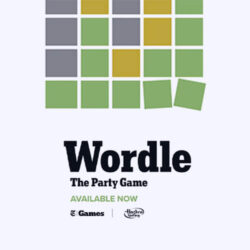
The New York Times teamed up with Hasbro to create “Wordle: The Party Game,” a board game based on the online version. This game variant is for two to four players. Each round, one player picks a secret word for the others to guess following the same rules as the online game. The game was released in October 2022.
Charlie Hall from Polygon described the physical game as a “cut-and-paste job” saying it simply replicated the online mechanics without adding any new features to make it more suitable for a party game.
“Wordle is more than just a game; it’s a daily ritual that unites players around the world in a shared pursuit of curiosity and joy.” — Josh Wardle”
